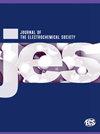Atmospheric Influences on Li6PS5Cl Separators and the Resulting Ionic Conductivity for All-Solid-State Batteries
IF 3.3
4区 工程技术
Q2 ELECTROCHEMISTRY
引用次数: 0
Abstract
All-solid-state batteries (ASSBs), defined through a solid electrolyte, are emerging as a promising solution to address current challenges in energy and power density demands for electromobility. Within the various possible types of solid electrolytes, sulfide-based materials exhibit advantageous high ionic conductivities. However, due to the strong reactivity of sulfides, atmospheric exposure can lead to the formation of toxic hydrogen sulfide and additionally negatively impact the resulting battery performance. Both factors present key challenges for ASSB production, as they necessitate the development of a material-adapted, economically viable and safe process atmosphere. In the present study, the influence of different production atmospheres on sulfide-based solid electrolytes is experimentally investigated. For this purpose, sulfide sheets are exposed to defined atmospheres with dynamic air fluctuations at dew points ranging from −60 °C to 0 °C. The resulting ionic conductivities indicate a dependency on the prevailing dew point and exposure time with a discernible impact on performance even at dew points of −60 °C within atmospheres with constant air circulation. With the acquired results, a detailed and knowledge-based selection and design of dry room production atmospheres for ASSB cell assembly is possible, which is a necessary step for further industrialization.大气对全固态电池中 Li6PS5Cl 分离剂及其离子电导率的影响
通过固体电解质定义的全固态电池(ASSB)正在成为一种有前途的解决方案,以应对当前电动汽车在能量和功率密度需求方面的挑战。在各种可能的固态电解质类型中,硫化物基材料具有高离子电导率的优势。然而,由于硫化物具有很强的反应性,暴露在大气中会形成有毒的硫化氢,从而对电池性能产生负面影响。这两个因素都对 ASSB 的生产提出了关键挑战,因为它们要求开发一种与材料相适应、经济上可行且安全的工艺气氛。本研究通过实验研究了不同生产气氛对硫化物固体电解质的影响。为此,硫化片暴露在露点为 -60 °C 至 0 °C 的具有动态空气波动的特定气氛中。结果表明,离子电导率与当时的露点和暴露时间有关,即使在露点为-60 °C、空气循环恒定的环境中,离子电导率也会对性能产生明显影响。有了这些结果,就可以根据知识详细选择和设计用于 ASSB 电池组装的干燥室生产环境,这是进一步工业化的必要步骤。
本文章由计算机程序翻译,如有差异,请以英文原文为准。
求助全文
约1分钟内获得全文
求助全文
来源期刊
CiteScore
7.20
自引率
12.80%
发文量
1369
审稿时长
1.5 months
期刊介绍:
The Journal of The Electrochemical Society (JES) is the leader in the field of solid-state and electrochemical science and technology. This peer-reviewed journal publishes an average of 450 pages of 70 articles each month. Articles are posted online, with a monthly paper edition following electronic publication. The ECS membership benefits package includes access to the electronic edition of this journal.

 求助内容:
求助内容: 应助结果提醒方式:
应助结果提醒方式:


